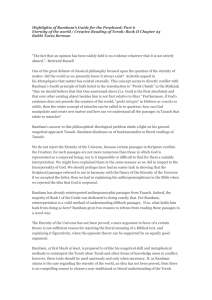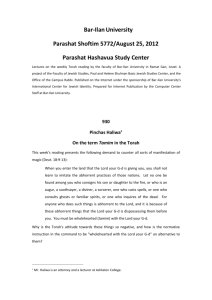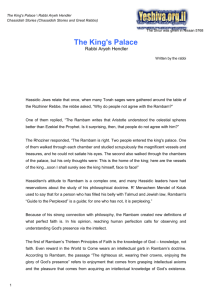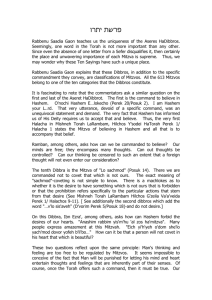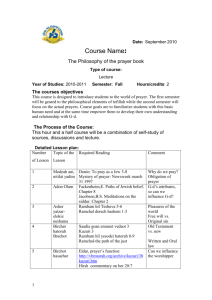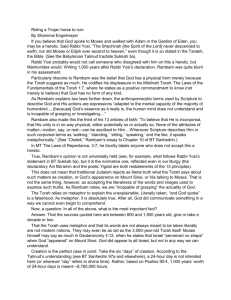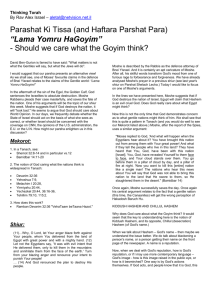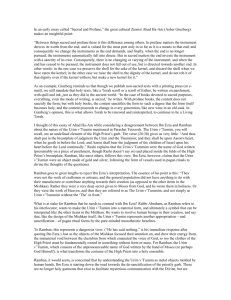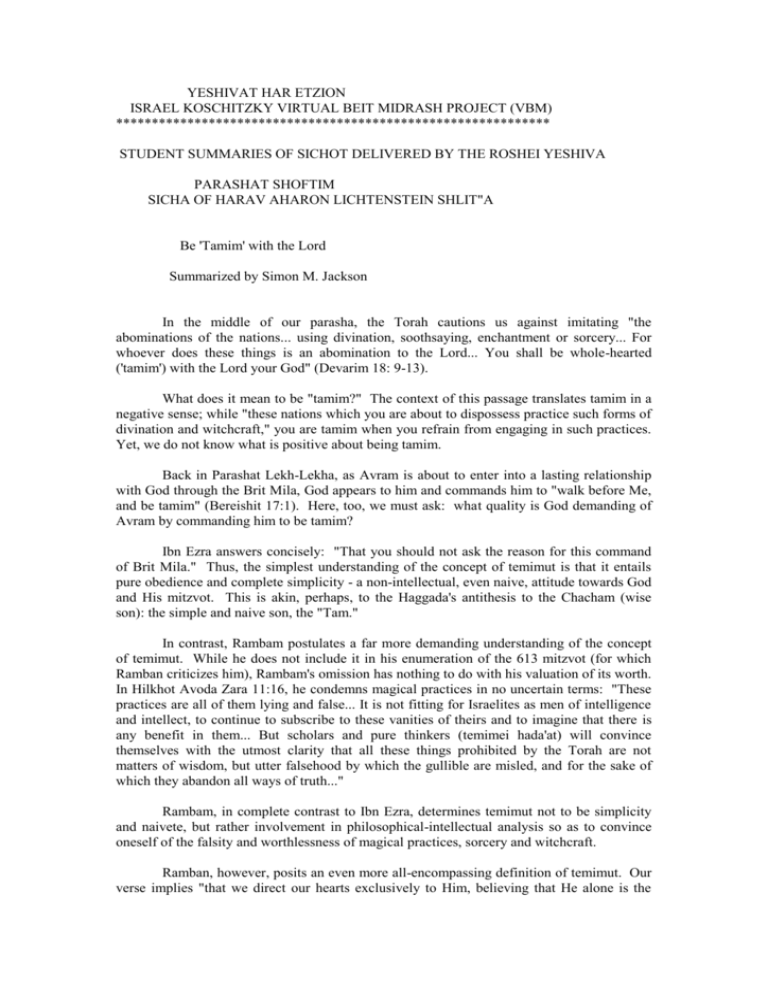
YESHIVAT HAR ETZION
ISRAEL KOSCHITZKY VIRTUAL BEIT MIDRASH PROJECT (VBM)
*************************************************************
STUDENT SUMMARIES OF SICHOT DELIVERED BY THE ROSHEI YESHIVA
PARASHAT SHOFTIM
SICHA OF HARAV AHARON LICHTENSTEIN SHLIT"A
Be 'Tamim' with the Lord
Summarized by Simon M. Jackson
In the middle of our parasha, the Torah cautions us against imitating "the
abominations of the nations... using divination, soothsaying, enchantment or sorcery... For
whoever does these things is an abomination to the Lord... You shall be whole-hearted
('tamim') with the Lord your God" (Devarim 18: 9-13).
What does it mean to be "tamim?" The context of this passage translates tamim in a
negative sense; while "these nations which you are about to dispossess practice such forms of
divination and witchcraft," you are tamim when you refrain from engaging in such practices.
Yet, we do not know what is positive about being tamim.
Back in Parashat Lekh-Lekha, as Avram is about to enter into a lasting relationship
with God through the Brit Mila, God appears to him and commands him to "walk before Me,
and be tamim" (Bereishit 17:1). Here, too, we must ask: what quality is God demanding of
Avram by commanding him to be tamim?
Ibn Ezra answers concisely: "That you should not ask the reason for this command
of Brit Mila." Thus, the simplest understanding of the concept of temimut is that it entails
pure obedience and complete simplicity - a non-intellectual, even naive, attitude towards God
and His mitzvot. This is akin, perhaps, to the Haggada's antithesis to the Chacham (wise
son): the simple and naive son, the "Tam."
In contrast, Rambam postulates a far more demanding understanding of the concept
of temimut. While he does not include it in his enumeration of the 613 mitzvot (for which
Ramban criticizes him), Rambam's omission has nothing to do with his valuation of its worth.
In Hilkhot Avoda Zara 11:16, he condemns magical practices in no uncertain terms: "These
practices are all of them lying and false... It is not fitting for Israelites as men of intelligence
and intellect, to continue to subscribe to these vanities of theirs and to imagine that there is
any benefit in them... But scholars and pure thinkers (temimei hada'at) will convince
themselves with the utmost clarity that all these things prohibited by the Torah are not
matters of wisdom, but utter falsehood by which the gullible are misled, and for the sake of
which they abandon all ways of truth..."
Rambam, in complete contrast to Ibn Ezra, determines temimut not to be simplicity
and naivete, but rather involvement in philosophical-intellectual analysis so as to convince
oneself of the falsity and worthlessness of magical practices, sorcery and witchcraft.
Ramban, however, posits an even more all-encompassing definition of temimut. Our
verse implies "that we direct our hearts exclusively to Him, believing that He alone is the
Doer of all and it is He who knows the truth regarding the future and it is from Him that we
should ask that which is to come... We should not consult soothsayers nor believe that their
words will be authenticated. We should rather realize that everything is in the hand of
Heaven... The same commandment was referred to in the covenant made with Avram... who
was the opponent of his Chaldean neighbors, who attributed power to the sun, moon and
stars. He had realized that there was one Creator and Governor. He was commanded,
therefore, to be whole-hearted in his service of God."
In contrast to both the Ibn Ezra's definition of temimut, as entailing simplicity, and
the Rambam's purely intellectual-philosophical understanding of the concept, Ramban views
being tamim as developing an all-embracing relationship, intellectually and emotionally, with
the Almighty. It is a relationship that is far more demanding than Ibn Ezra's "not probing into
the rationale behind the mitzvot" on the one hand, and far more all-encompassing than the
Rambam's "intellectual proofs against such worthless and vain practices of the nations" on
the other. Ramban's explanation of temimut demands a full, integrated relationship with God.
We must not only convince ourselves intellectually of God's singularity, but must cultivate a
relationship with God, reaching such an intensity of closeness that we feel no need for
external intermediaries.
Applying these three different understandings of being tamim in one's avodat
Hashem (service of God) on a practical level is no mean feat! One thing is clear: all three
interpretations of temimut are equally valid. There is a time and a place for each approach in
our religious consciousness. And we must be sure not to disparage either those who appear
more naive than ourselves spiritually, nor those who have an even greater degree of
sophistication in their avodat Hashem.
Ramban quotes another implication of temimut - sheleimut: wholeness or perfection,
"like an unblemished lamb" ("seh tamim" - Shemot 12:5). If we had to choose between being
small but perfect (like a newly born lamb) in our relationship with God, or striving for a
broader relationship with God and His Torah but foregoing our temimut - it is clear that we
should opt for the former lifestyle.
Yet one's optimal relationship with Hashem must surely be one which integrates into
a harmonious whole both the simplicity of the seh tamim and the size and strength of the
fully grown ram. Only with such lofty aspirations can we succeed in deepening and
expanding our relationship with the Almighty, and thus enhance our avodat Hashem slowly
but surely.
(Originally delivered at Seuda Shelishit, Shabbat Parashat Shoftim 5755.)
*************************************************************
For a complete list of YHE Virtual Beit Midrash curriculum, send e-mail to:
LISTPROC@VIRTUAL.CO.IL:, on first line of text type: info YHE-ABOUT .
*************************************************************
Copyright (c) 1995 Yeshivat Har Etzion. All rights reserved.
*************************************************************
SHIURIM MAY BE DEDICATED TO VARIOUS OCCASIONS - YAHRZEITS, SEMACHOT, BIRTHDAYS,
ETC. PLEASE E-MAIL YHE@VIRTUAL.CO.IL FOR AN APPLICATION.
YESHIVAT HAR ETZION
ISRAEL KOSCHITZKY VIRTUAL BEIT MIDRASH
ALON SHEVUT, GUSH ETZION 90433 ISRAEL
E-MAIL: YHE@VIRTUAL.CO.IL or OFFICE@ETZION.ORG.IL

